Donald Trump’s Russian riddle
After last fall’s presidential election, U.S. intelligence officials received intriguing reports about Russian officials talking to each other about the surprise election of Donald Trump. The conversations were piecemeal and ambiguous but to some disturbing. “They were talking about their expectations for Trump — about what might happen in a Trump administration,” said one intelligence source who was briefed on the reports. In the view of some officials, the Russians seemed to be celebrating — and congratulating themselves, either on their good fortune, or more ominously, their good work.
These reports hardened a view that was starting to gain currency among some senior officials: that Russia’s cyberattacks on U.S. political figures — an “active measure” that appeared to have been authorized by Russian President Vladimir Putin — had not simply been aimed at sowing distrust among the U.S. electorate or even to discredit the expected winner, Hillary Clinton. Instead, it seemed to be part of a conscious effort by the Kremlin to influence the outcome of the election.
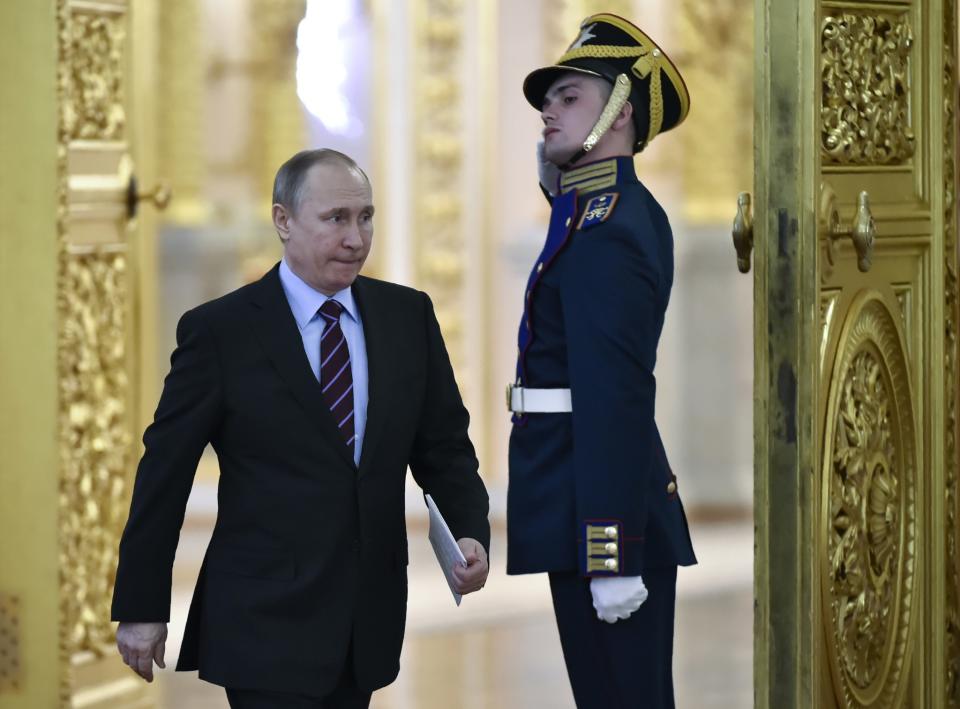
Soon, U.S. officials began receiving other reports — some from foreign intelligence services — about the ties between multiple individuals in Trump’s orbit and figures either close to Putin or with suspected involvement in Russian intelligence. What exactly did these connections add up to, U.S. officials wanted to know. And did they explain the apparent interest by the Kremlin in boosting Trump’s campaign?
Nearly six months later, right at the 100-day mark of Trump’s presidency, those questions still linger — and now hang over the Trump White House like a “big gray cloud,” as House intelligence committee Chairman Devin Nunes, R-Calif., put it last month. The story of Russia’s meddling in the 2016 election, and possible collusion by associates of Trump, has produced a series of revelations that have dominated the headlines and cable television coverage of the Trump White House. Nearly three-quarters of all Americans, 73 percent, according to a new NBC News/Wall Street Journal poll, now want an independent commission to investigate the issue. But the story remains as murky and puzzling as ever.
So let’s break down what we know — and don’t know — about this story.
First, the Russian cyberattacks on the election
“I don’t think anybody knows it was Russia that broke into the DNC. [Hillary Clinton is] saying Russia, Russia, Russia, but I don’t — — maybe it was. I mean, it could be Russia, but it could also be China. It could also be lots of other people. It also could be somebody sitting on their bed that weighs 400 pounds, OK?”
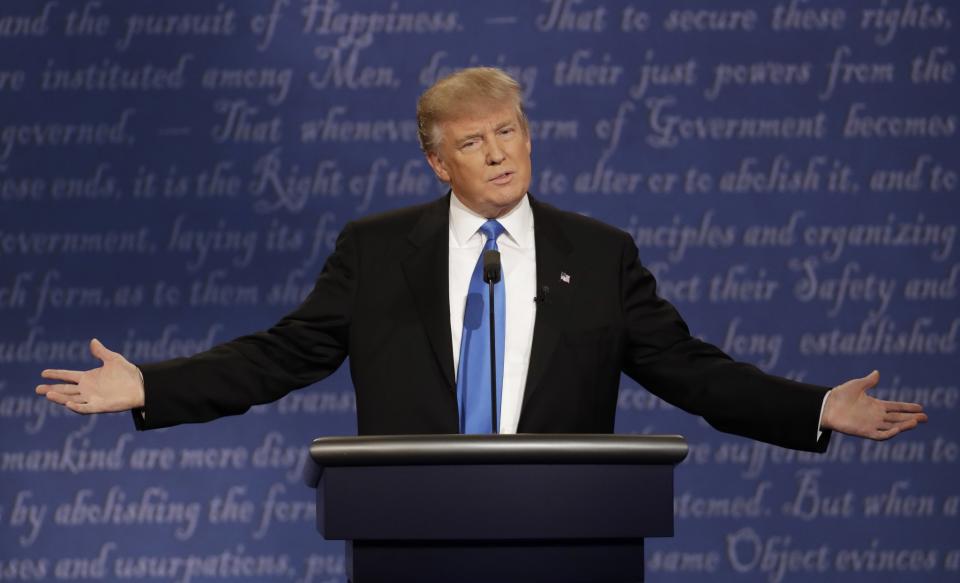
That was Donald Trump during the first presidential debate with Hillary Clinton, last Sept. 26. But since then, the views of the U.S. intelligence community have reached what officials called “high confidence” that two separate groups of Russian state sponsored hackers, one of them associated with the country’s military intelligence arm known as the GRU, were behind the hacks. On Jan. 6, the office of the director of national intelligence produced a report — unanimously endorsed by all 17 U.S. intelligence agencies — that Putin ordered a wide-ranging influence campaign aimed at the U.S. presidential election in part because he had a “vendetta” against Clinton and preferred Trump. Even Trump now seems to accept its basic conclusions. “As far as hacking, I think it was Russia,” said Trump a few days after the intelligence report was released.
But that influence campaign wasn’t just about cyberattacks. It also included “weaponizing” the information that was purloined from Democratic political operatives, passing it off through a still mysterious intermediary to WikiLeaks, creating phony online personas such as Guccifer 2.0, and using legions of trolls and botnets to manipulate social media — and ultimately American public opinion. “It was something we hadn’t seen before,” said a U.S. intelligence official.
So what did the Trump campaign and Trump’s associates know about Russia’s activities?
Roger Stone, Trump’s longtime adviser, boasted during the campaign that he had inside information about what WikiLeaks was about to publish, tweeting during the summer messages like this: “Trust me, it will soon the Podesta’s time in the barrel,” an apparent reference to the upcoming release by WikiLeaks of Clinton campaign chairman John Podesta’s personal emails — hacked, according to U.S. intelligence, by Russia’s military intelligence service.
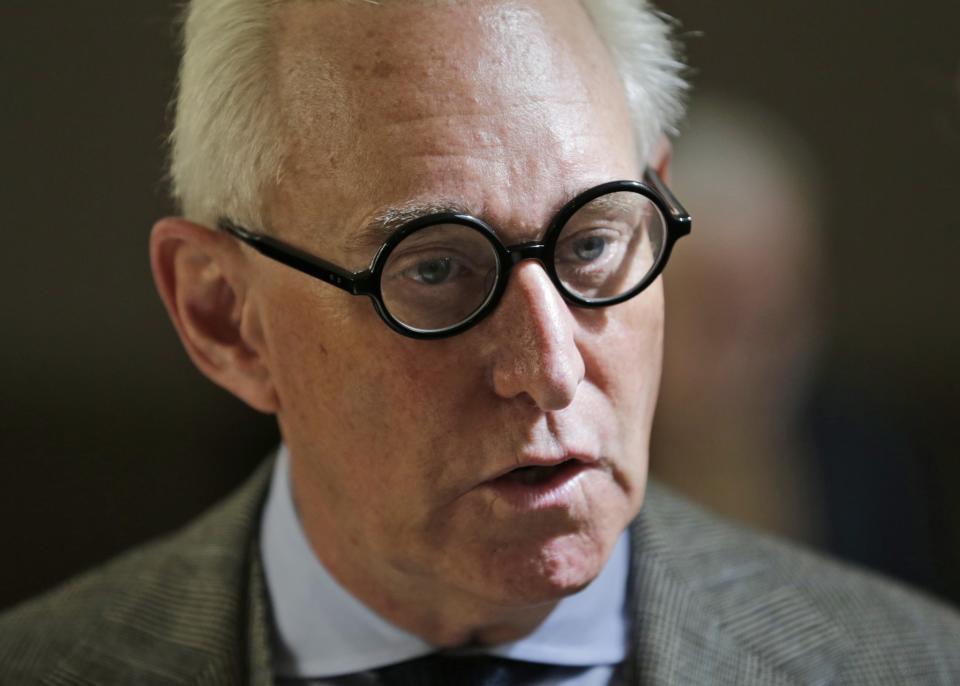
But Stone has denied receiving any inside information directly from WikiLeaks — although in an interview with Yahoo News he said he won’t reveal who was tipping him off about the upcoming document dumps because as a journalist — he says he is one — he won’t reveal his sources. “I’m just as much a journalist as you are, my friend,” said Stone, who writes for a website called StoneColdTruth and makes regular appearances on conspiracy theorist Alex Jones’ Infowars radio show. “I have no intention of burning a source.”
What connections did Trump’s advisers have to the Kremlin?
One key player is Lt. Gen. Mike Flynn, former director of the Defense Intelligence Agency and Trump’s first national security adviser. In December 2015, before he joined the Trump campaign, Flynn flew to Moscow to participate in the 10th anniversary celebration of RT — the Russian government TV propaganda network — and sat next to Putin at a black tie dinner. Flynn initially refused to say who paid him for that trip. “I didn’t take any money from Russia, I can tell you that,” he told Yahoo News when first questioned about his compensation for the trip last July during the Republican National Convention. Then who paid you? He was asked. “My speakers bureau,” he replied. “Ask them.”
It has since been revealed that Flynn was paid $45,000 by RT through his speakers bureau for that trip (as well as $23,000 in payments from two other Russian-owned firms). On Tuesday, after reviewing classified Defense Department documents, Rep. Jason Chaffetz and Rep. Elijah Cummings said Flynn had failed to disclose his Russian government payments or another $500,000 he received from a Dutch company linked to the Turkish government on his security clearance forms.

“Personally I see no evidence or no data to support the notion that Gen. Flynn complied with the law,” Chaffetz told reporters after the briefing.
Then, in February, Flynn was forced to resign after disclosures that he had secretly talked to Russian Ambassador Sergei Kislyak on Dec. 29, the same day President Obama imposed new sanctions on Russia — and then lied to Vice President Mike Pence about what they talked about, falsely denying they had discussed the lifting of those sanctions under a Trump presidency. More recently, like Stone, he’s offered to speak to investigators — but only if he first receives immunity.
And there’s more: Paul Manafort, Trump’s campaign manager, is under investigation for accepting payments from the ousted former pro-Putin president of Ukraine, Viktor Yanukovych. (Manafort recently announced his intentions to register retroactively as a foreign agent of Yanukovych’s political party — after being advised to do so by Justice Department officials.)
Another controversial figure at the center of the Russia probe is Carter Page, one of Trump’s former foreign policy advisers. As Yahoo News first reported last September, he’s been the subject of a U.S. intelligence investigation over alleged communications with Russian officials during his own trip to Moscow in July of last year — just before the Republican convention — where he allegedly discussed the lifting of sanctions as well. The Washington Post recently revealed that the FBI even sought and received a secret Foreign Intelligence Surveillance Court warrant to monitor Page’s communications on the grounds there was probable cause to believe he was the “agent of a foreign power.” But Page denies any wrongdoing or talking to Russian officials about sanctions — although, as he recently admitted to ABC’s George Stephanopoulos, he can’t deny that the subject ever came up during his Moscow trip. “I don’t recall every single word,” he said. “Something may have come up in a conversation. I have no recollection, and there’s nothing specifically that I would have done that would have given people that impression.”
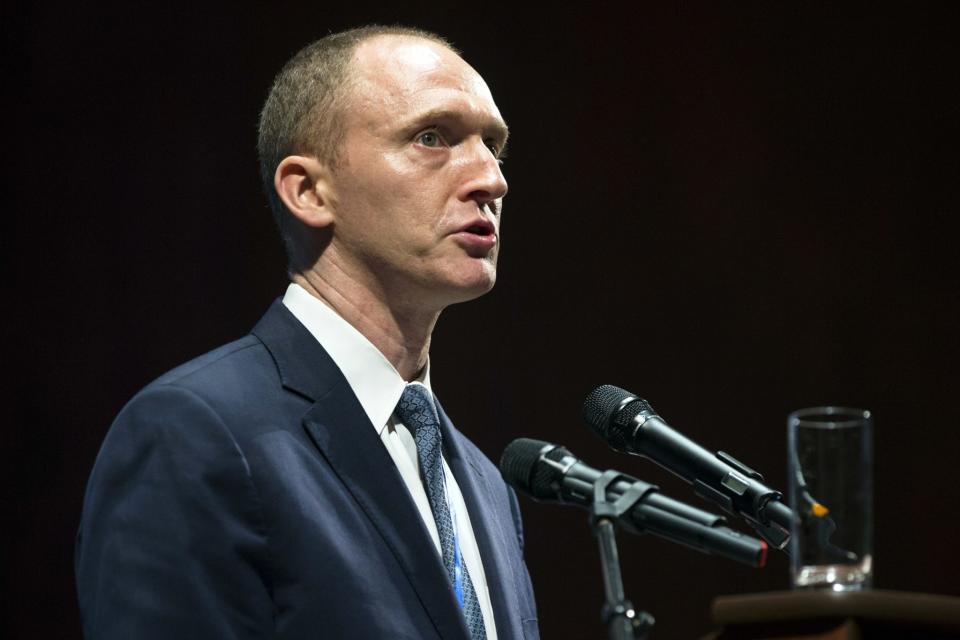
Follow the Russia investigations
None of this adds up to hard evidence of collusion, but it has spurred multiple investigations. An FBI inquiry was begun last July after agents received a damning but still uncorroborated dossier compiled by a former British spy. But at this stage, it’s still a counterintelligence, not a criminal, investigation. That means it could drag on for years — and may or may not result in any criminal charges against anyone. The House Intelligence Committee inquiry was seriously sidelined when Nunes was forced to step aside from the probe after claiming he had seen secret intelligence reports suggesting that Obama’s national security adviser, Susan Rice, had been improperly “unmasking” the names of Trump associates who had been picked up in intercepts of foreign officials targeted by the U.S. intelligence community. (Rice has denied she did anything improper and no evidence has surfaced that she did). Under the new leadership of Rep. Mike Conaway, R-Texas, the panel has scheduled a closed-door hearing with FBI Director James Comey and NSA Director Mike Rogers. Meanwhile, a Senate judiciary subcommittee, chaired by Sen. Lindsey Graham, has scheduled its own public hearing May 8, where former Deputy Attorney General Sally Yates is expected to testify about warnings she gave to White House counsel Don McGahn that Flynn had misrepresented his talks with Kislyak. James Clapper, the former director of national intelligence, is also slated to testify.

That leaves the Senate Intelligence Committee — the one body that some hoped might be able to get to the bottom of the Russian-Trump affair. But that probe too has mounting problems: It’s understaffed — only seven total investigators, most of whom also have other committee duties. And so far, more than three months into it, the panel has yet to issue a single subpoena for documents, emails or phone records — or to interview any of the key witnesses involved in the case. Now there are signs that Democrats are getting restless. This week, after Yahoo News published a story about the committee’s lack of progress, Intelligence Committee member Ron Wyden, D-Ore., said he had “serious concerns about this investigation” and Senate Minority Leader Chuck Schumer, D-N.Y., told reporters the committee “should move more quickly. It’s going very slowly.”
What about U.S.-Russia relations?
Meanwhile, the story of Russia and the Trump administration has taken off in unexpected directions. After Trump ordered a Tomahawk missile strike on the regime of Syrian President Bashar Assad, Putin’s staunch ally, Russia denounced the move, prompting Secretary of State Rex Tillerson to say after a recent round of talks in Moscow that U.S.-Russia relations had hit a “low point.” This week, Secretary of Defense Jim Mattis, during a trip to Afghanistan, accused Russia of increasing its shipments of machine guns and anti-aircraft weapons to the Taliban in what he suggested may be a violation of international law.
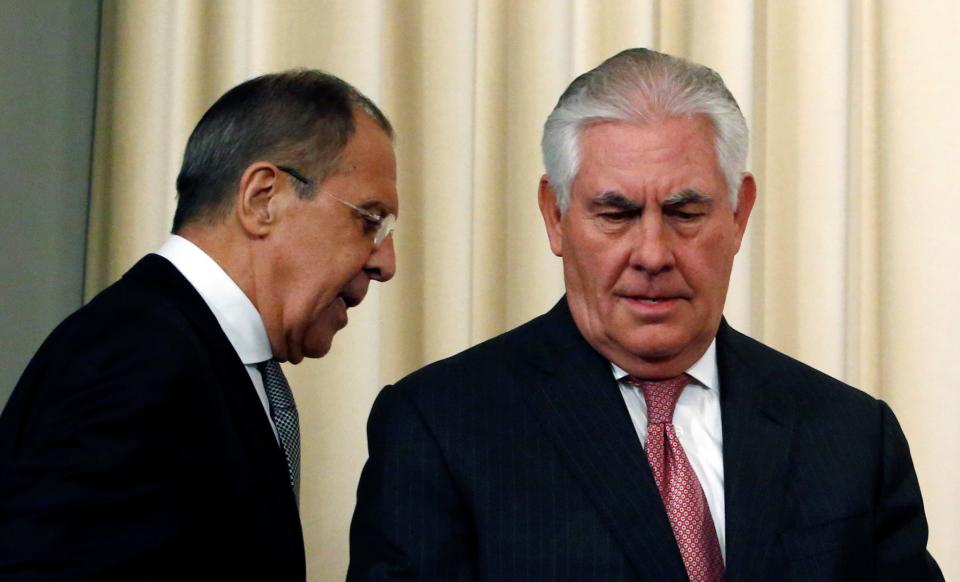
Another sign of trouble is the recent leak of top secret documents about how the CIA hacks smart phones and computers — material that showed up on the website of the Russians’ favorite outlet, WikiLeaks. The CIA and FBI are now reportedly hunting for a possible Russian mole who provided the material.
Leaks, cyberattacks, secret meetings, allegations of collusion and now possible Russian moles. It is a story with plenty of tentacles — and as the story continues to unfold, at least you can say, now I get it — at least for now.
Read more from Yahoo News’ coverage of Trump’s first 100 days:
? The contrarians: They didn’t vote for Trump, but they would now
? Trump foreign policy at 100 days: The downside of unpredictability
? Twitter, Mar-a-Lago and Obama bashing: The 45th president’s 100 days of norm-busting
? Photos: Voices from overseas: People from around the world consider Trump’s first 100 days



